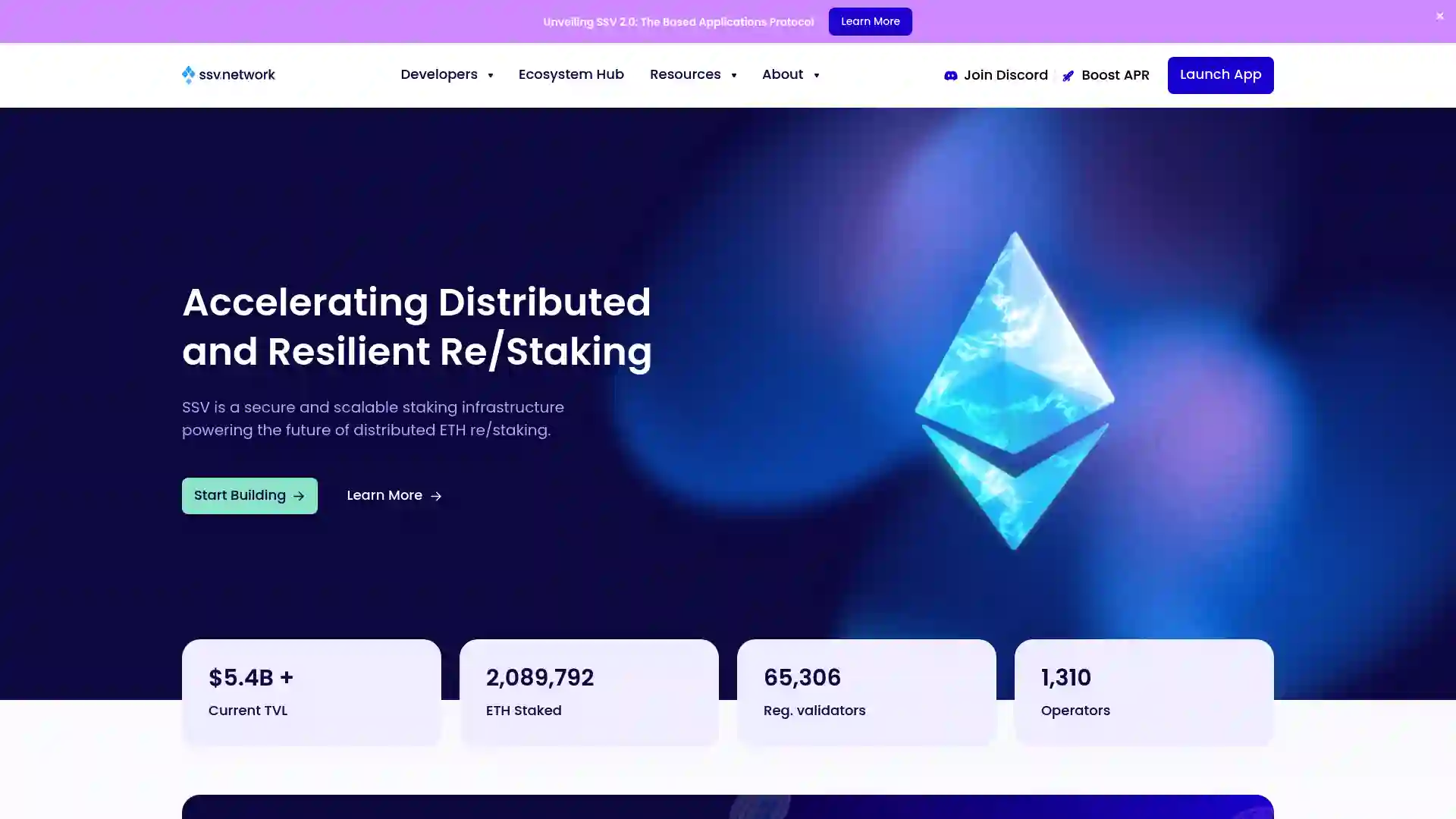SSV Network (SSV)
SSV Network is a fully decentralized, open-source Ethereum staking network utilizing Secret Shared Validator (SSV) technology.
Overview
SSV, also referred to as Distributed Validator Technology (DVT), offers an infrastructure solution for decentralizing Ethereum validators. It achieves this by distributing their operation across multiple non-trusting nodes within the network. Operating an Ethereum validator on ssv.network provides active-active redundancy and elevates validator key security. This approach benefits the Ethereum network, staking pools, staking services, and solo stakers. SSV functions as a sophisticated multi-signature wallet integrated with a consensus layer, serving as an intermediary layer between a beacon node and a validator client. From a user's perspective, it acts as a plug-in component that handles tasks on their behalf.

| Ticker | SSV |
| Category | Ethereum Ecosystem |
| Website | https://ssv.network/ |
| @ssv_network | |
| Contract Addresses | |
|---|---|
| ethereum | 0x9d...54 Copied! Copied! |
Distributed key generation
This process generates a shared public and private key set, calculated by the operators running an SSV instance. Each operator holds a portion of the private key, ensuring no single operator can control or affect the entire private key.
Shamir secret sharing
Shamir Secret Sharing is used to reconstruct a validator key using a predefined threshold of KeyShares. Individual KeyShares cannot sign a duty on their own, but not all are required if some are faulty. The network can leverage BLS signatures, allowing multiple signatures to be combined to recreate a validator key signature. By combining Shamir Secret Sharing and BLS, keys are divided into shares and regrouped whenever a duty is assigned.
Multi-party computation
Secure Multi-Party Computation (MPC) is applied to secret sharing, allowing KeyShares of an SSV to be distributed securely among operators. This enables decentralized computation of validator duties without reconstructing the validator key on a single device.
Istanbul Byzantine fault tolerance consensus
The consensus layer of SSV is based on the Istanbul Byzantine Fault Tolerance (IBFT) algorithm. This algorithm randomly selects a validator node (KeyShare) responsible for block proposal and sharing information with other participants. Once the predetermined threshold of KeyShares validates the block, it is added to the chain, ensuring consensus is reached even if some operators are faulty or offline.
Network
The ssv.network ecosystem consists of three types of actors: stakers, operators, and DAO members.
Stakers
Stakers include services or individual Ethereum holders who use SSV/DVT technology to optimize the liveness, security, and decentralization of their validators. They pay fees in SSV tokens to operators for managing their validators.
Operators
Operators provide the hardware infrastructure, run the SSV protocol, and are responsible for maintaining validators and the overall health of ssv.network. They set their service fees in SSV tokens and charge stakers for operating and maintaining their validators.
DAO
The ssv.network DAO decentralizes the ownership and governance of the ssv.network protocol and treasury, with SSV as the native token. The DAO uses two main mechanisms: executing governance functions and executing snapshot proposals passed by token holders.
SSV Token
The Secret Shared Validator ($SSV) token is native to ssv.network. It serves two primary purposes: payments and governance.
- Payments: Stakers use SSV tokens to compensate operators for managing their validators.
- Governance: SSV tokens enable participation in ssv.network decision-making and treasury allocations.
Tokenomics
Stakers on ssv.network pay operators and network fees using $SSV. Operators set their fees, compete with others, and earn based on staked ETH. More ETH staked results in more fees paid to operators and the DAO's treasury, which can then be used to promote network growth and development. $SSV is designed to enhance the network's core values, including decentralized DAO governance, DAO treasury, and operator income.
Governance
The ssv.network DAO is key to decentralizing ownership and governance of the ssv.network protocol and treasury. The SSV token enables holders to participate in governance by voting on DAO-related matters. The DAO operates through two main mechanisms: executing governance functions via the governance multi-sig and executing snapshot proposals passed by token holders. Various appointees and working groups within the DAO carry out these tasks.
